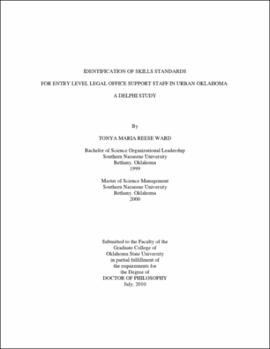| dc.contributor.advisor | Ausburn, Lynna J. | |
| dc.contributor.author | Ward, Tonya Maria Reese | |
| dc.date.accessioned | 2013-11-26T08:34:50Z | |
| dc.date.available | 2013-11-26T08:34:50Z | |
| dc.date.issued | 2010-07 | |
| dc.identifier.uri | https://hdl.handle.net/11244/7548 | |
| dc.description.abstract | Scope and Method of Study: The purpose of this study was to use industry experts to identify critical skills or competencies perceived by the legal profession to be required by competent team members in the legal office environment. Specifically, this study focused on fulfilling this purpose in the context of urban Oklahoma, where a large number of legal office professionals are employed. This study applied electronic Delphi methodology to replace the traditional face-to-face DACUM procedure to develop an industry-driven, occupationally-specific, and competency-based description of the job profile of new legal office professionals. The study used the input of industry experts to identify specific skills necessary for entry-level legal office support staff personnel. The participants or Delphi panel were six legal administrators from Oklahoma City, Oklahoma, each with a minimum of 10 years of experience in the legal office environment. The theoretical framework was based on the dual strands of competency-based education and a task analysis approach for generating industry-based skill standards or competencies. The Delphi was conducted in three rounds using researcher developed questionnaires. Round one of the Delphi used an open-ended questionnaire based broad skill categories, while rounds two and three used more structured rating and ranking responses to obtain data. | |
| dc.description.abstract | Findings and Conclusions: The study indicated that Delphi was a successful substitute for the DACUM process, allowing the industry panel to present a clear skill profile of competent entry-level legal office professionals. Using rating and ranking procedures, 14 categories of skills were divided into five tiers. The top or most important tier as indicated by the expert panel consisted of the skill categories Oral Communications, Written Communications, and Client Assistance. These categories received sigma RankPoint scores and mean importance scores, respectively in the order listed. The panel of experts perceived that internal and external communications with attorneys, clients, supervisors, vendors and co-workers in a clear distinctive manner ranked high on the list of needed skills. Use of proper grammar; proofreading and editing skills; recognizing urgent situations; maintain confidences; and exhibiting a customer service mentality were also highly ranked in these categories. The results of the Delphi profile were readily adapted into a traditional occupational Duty Task List for use in curriculum development. | |
| dc.format | application/pdf | |
| dc.language | en_US | |
| dc.rights | Copyright is held by the author who has granted the Oklahoma State University Library the non-exclusive right to share this material in its institutional repository. Contact Digital Library Services at lib-dls@okstate.edu or 405-744-9161 for the permission policy on the use, reproduction or distribution of this material. | |
| dc.title | Identification of skills standards for entry level legal office support staff in urban Oklahoma: A Delphi study | |
| dc.contributor.committeeMember | Self, Mary Jo | |
| dc.contributor.committeeMember | McCharen, Belinda K. | |
| dc.contributor.committeeMember | Conti, Gary J. | |
| osu.filename | ReeseWard_okstate_0664D_10967 | |
| osu.accesstype | Open Access | |
| dc.type.genre | Dissertation | |
| dc.type.material | Text | |
| dc.subject.keywords | competency-based education | |
| dc.subject.keywords | dacum | |
| dc.subject.keywords | delphi | |
| dc.subject.keywords | duty task list | |
| dc.subject.keywords | job analysis | |
| dc.subject.keywords | task analysis | |
| thesis.degree.discipline | Teaching and Curriculum Leadership | |
| thesis.degree.grantor | Oklahoma State University | |
